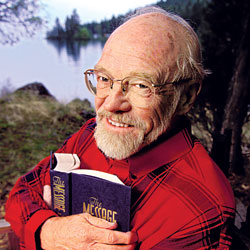 |
|
Spring 2007 | Volume 30, Number 1
| Features
|
|
|
Eat This Book
Hungry for Scripture? Author
Eugene Peterson is your nutritionist

Eugene Peterson |
When was the last time you salted and peppered one of Paul’s epistles, and cut into it with a steak knife? Have you ever tasted
1 Timothy, or chewed on a psalm?
If Seattle Pacific University alumnus Eugene Peterson ’54 had his way, we’d all be feasting on Scripture. And we would take our time doing it, savoring every bite.
When the Apostle John encountered an angel reading the word of God, the angel interrupted him with instructions: “Eat this book.” Peterson has accepted that challenge, and even made it the title of his new book — Eat This Book (Eerdmans, 2006).
He urges Christians to consider the Bible’s nourishing power. Zeal for Jesus is not enough, he says. We are spiritually malnourished because we are not reading the Bible properly (if we are reading it at all).
Despite the Reformation’s embrace of the Bible as authoritative, today’s Christians often demonstrate ignorance of how early Christians — even Christ himself — interpreted Scripture, says Peterson. Contemporary Christians tend to turn to the Bible for verses that can support their own particular opinions regarding ministry, morality, politics, or other subjects.
“We haven’t recovered from the era of historical criticism,” says Peterson. “From the middle of the 19th century up until the late 20th century, historical criticism dominated all of the schools and reduced Scripture to data and historical details. ... Most university and college students are taught the historical critical method, which means you are controlling the text. You decide what you’re going to listen to, what’s worthwhile, what’s important, and what’s true.”
Good Bible readers, says Peterson, will be attentive, not just to the immediate context, but to the larger context of the whole Bible. He writes in Eat This Book, “Maybe it is because Scripture comes to us so authoritatively — God’s word! — that we think all we can do is submit and obey. Submission and obedience are a large part of it, but first we have to listen. And listening requires listening to the way it is said (form) as well as to what is said (content).”
Drawing from many years of experience as a pastor and translator (he reads the Bible in Hebrew and Greek), Peterson highlights the rewards of meditating on Scripture. The Hebrew word for meditate is hagah — the same word used in Isaiah 31:4 to describe how a lion savors its prey. Peterson likens this to the way a dog “meditates” on a bone. Most Christians have sampled Scripture. But how many of us have meditated on both the Old and New Testaments, right down to the marrow?
The author of Eat This Book also penned the paraphrasing translation of the Bible simply titled The Message. The best seller, published by NavPress, has sold millions of copies worldwide. Read Peterson's account (published in the Summer 2002 Response) of how he came to write The Message.
Back to the top
Back to Features Home
|
| |
|
 |
 |

|
 |
from the president
Embracing the Christian Story
SPU President Philip Eaton asks what would happen if the Bible were at the center of the learning enterprise.
campus
Destination: Asia
SPU President Philip Eaton joined a historic delegation of U.S. university presidents that visited Asia.
alumni
Coffee as Change Agent?
Pura Vida employees, including several SPU alumni, engage the culture using a social-venture business model.
books, film, & music
Dark Alphabet
Jennifer Maier, poet and SPU associate professor of English, receives a literary award for her first book.
athletics
National Tournament Returns
For the first time in 10 years, SPU hosts the USA Gymnastics Women's Collegiate Championship.
my response
Undone by the Word
Response writer Kathy Henning shares her journey to know the Bible better.
Response art
Pink Emperors
Class of 1973 alumna Jill Ingram introduces Response readers to “Pink Emperors.”
|
 |
|
 |